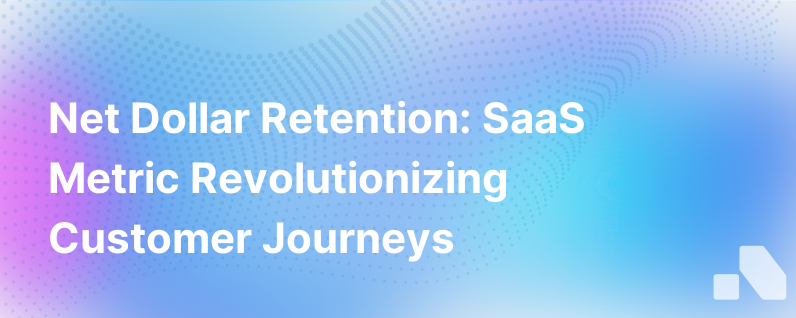
In the world of Software as a Service (SaaS), the metrics by which companies measure growth and success are continuously evolving. Among the plethora of performance metrics, Net Dollar Retention (NDR) stands out as a critical indicator of customer satisfaction and the overall health of a SaaS business. It reflects not just the sustainability of the business model but the quality of the customer journey.
In this article, we dive deep into Net Dollar Retention, understanding its pivotal role in mapping the customer journey and why it's considered one of the most, if not the most, telling metrics for SaaS businesses.
Understanding Net Dollar Retention (NDR)
NDR measures the revenue retention of a company's existing customer base, taking into account upgrades, downgrades, and churn. In essence, it is the percentage of recurring revenue retained from existing customers in a given time period, including whatever extra revenue you've been able to upsell or cross-sell to them, minus any revenue lost from churn.
A simplified formula for NDR looks like this:
NDR = (Starting MRR + Expansion MRR - Churned MRR) / Starting MRR * 100
where MRR stands for Monthly Recurring Revenue.
A Net Dollar Retention rate that exceeds 100% signifies that your revenue from existing customers — even after accounting for churn — is growing. In contrast, an NDR below 100% indicates that the lost revenue from those customers is outpacing gains from account upgrades or expansions.
The Importance of NDR in Shaping the Customer Journey
The customer journey in SaaS does not end at the point of sale — that's just the beginning. The continuing relationship between a SaaS company and its customers involves ongoing interactions, additional sales, support, renewals, and possibly terminations. How this relationship is nurtured is reflected in the business's NDR.
Let's explore the elements of NDR and how they interconnect with a customer's journey:
-
Customer Success and Support Initiatives: Customer success directly influences expansion MRR. When a customer is successful with your product, they're more likely to enhance their use of your service through upgrades or buying additional features, which positively impacts NDR.
-
Product Value and UX: If customers consistently find value in your product and enjoy a seamless user experience, they’re less inclined to downgrade or churn, preserving your MRR and therefore, your NDR.
-
Upsell and Cross-sell Strategies: Skillful upsell and cross-sell techniques guided by the customer journey can significantly increase your expansion MRR, lifting your NDR.
-
Customer Feedback Loop: Integrating customer feedback into product development is crucial for addressing pain points that may lead to churn, thereby shoring up your NDR.
-
Pricing Flexibility: SaaS companies often adjust their pricing strategies to reflect the evolving value of their offering, which impacts both upgrades and downgrades, thus influencing NDR.
NDR As an Indicator and Driver of Growth
Net Dollar Retention isn't merely a retrospective barometer of performance; it's also a forward-looking indicator of growth potential and customer satisfaction.
-
Sustainability & Lifetime Value: A high NDR suggests that customers find lasting value in a product, increasing the Lifetime Value (LTV) of each customer and indicating a healthy, viable SaaS business model with sustainable growth.
-
Market Position & Competitive Strength: The ability to expand MRR despite churn rates implies a product's strong position in the market and suggests that the service offered is competitively valuable.
-
Investor Outlook & Company Valuation: NDR is closely watched by investors as an indicator of a company's future revenue potential and ability to scale. A robust NDR can lead to better valuation multipliers.
Best Practices for Improving Net Dollar Retention
Improving NDR means enhancing the journey your customers embark on once they sign up for your service. Here are some actionable strategies:
-
Focus on Customer Success: Establishing a proactive customer success team that ensures clients are achieving their desired outcomes can lead to increased customer satisfaction and expansion MRR.
-
Iterate Based on Feedback: Use customer feedback to prioritize product improvements that drive value, encouraging upgrades and reducing churn.
-
Refine Onboarding: A smooth onboarding process is pivotal to long-term retention. Ensure that customers understand and derive value from your product from the onset.
-
Offer Tailored Solutions: Personalize your service offerings through segmentation to meet your customers’ specific needs, which often leads to account growth.
-
Strengthen Relationships: Build solid relationships through consistent engagement and by providing exceptional support.
-
Monitor Usage Patterns: Tracking how customers engage with your product can highlight opportunities for upselling or the risk of churn.
Concluding Thoughts and the Aomni Solution for NDR
Net Dollar Retention is more than a metric; it's a narrative of your customer's journey — from their initial perception of your product to their long-term satisfaction and growth partnership.
By rigorously tracking and optimizing NDR, SaaS companies can gain tangible insights into customer behavior patterns, product-market fit, and their service's ongoing value proposition. In a competitive SaaS landscape, NDR serves as a critical compass pointing towards customer-centric strategies that yield sustained growth.
And to seamlessly integrate these strategies into a SaaS business's growth plan, solutions like Aomni are equipped to aid in every step of the journey. With tools for real-time account research, actionable competitive insights, and personalized sales content, Aomni can streamline the entire customer experience without the need for excess manual effort, reinforcing those positive NDR trends indicative of a successful and evolving customer journey.